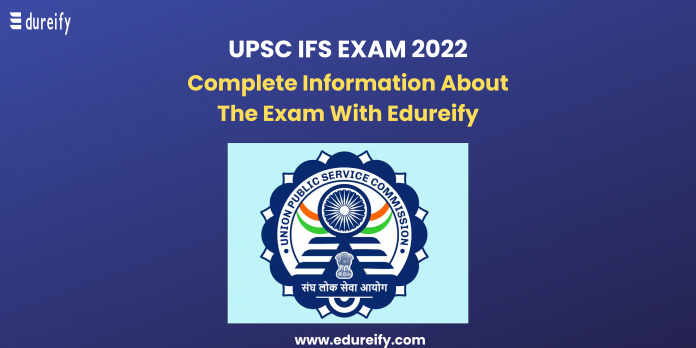Candidates must note that the UPSC IFS or the Indian Foreign Service examination will be conducted on 05th June 2022. Those who are interested in the examination must read the whole information provided by Eduriefy.
UPSC IFS Apply Online 2022
In the following section, you will get the instructions for the UPSC IFS Apply Online 2022. Follow each of the instructions given below pertinently to apply online without any issues.
- The candidates can apply online on the official website of the Union Public Service Commission.
- The applicants are required to have any one of the following identities in their possession while applying online for the UPSC IFS exam-
- Voter Card
- Aadhar Card
- Passport
- PAN Card
- School Photo ID
- Driving License
- You will be providing the number of your Photo ID card in the application form along with a scanned softcopy of the same Photo ID.
- Aspirants are now also facilitated with the opportunity to withdraw their application for the UPSC IFS, in case they do not wish to appear for the exam.
- The Photo Identification mentioned and provided by the candidate will be used for all future purposes co-relating the UPSC IFS Recruitment, For example, the same Photo Id card will be mandatory.
| Events | Dates |
| Notification Released | 05th February 2022 |
| Application Begins | 06th February 2022 |
| Application Ends | 21st February 2022 |
| Application Fee Starting Date | Same |
| Application Fee Ending Date | Same |
| Admit Card | Last week of May |
| Exam Date | 05th June 2022 |
UPSC IFS Eligibility Criteria
The candidates who are preparing for the UPSC IFS exam must know whether they meet the eligibility criteria or not. There are certain criteria for the eligibility of any candidate aspiring for the UPSC IFS exam. The IFS eligibility criteria include physical requirements for IFS, height, weight, and eyesight required IFS. For the UPSC IFS 2022 the eligibility criteria are as follows:-
- The candidate must be a graduate of any recognized university.
- Must be an Indian or some other friendly nation such as Nepal, Sri Lanka, etc.
- He/she must be within the age limit of 21 years to 32 years of age.
UPSC IFS 2022 Exam Pattern
The candidates who wish to clear the UPSC IFS 2022 exam on the first attempt, should know about the UPSC IFS 2022 exam pattern. Knowing the exam pattern helps a lot in deciding the exam preparation strategy for the UPSC IFS 2022.
The Written Exam of UPSC IFS 2022 consists of Two Papers:-
- Paper 1 General Studies
- Paper 2 is the General Ability Test or Aptitude Test.
- The Two Papers Carry a total Mark of 400. The second paper is qualifying in nature.
UPSC IFS Syllabus 2022
UPSC IFS Prelims Syllabus
- The Preliminary exam is the first stage of the selection process for the UPSC IFS 2022.
- It comprises two compulsory papers that are UPSC question papers.
- The UPSC 2022 Pre-Paper is composed of two papers: Paper Ⅰ & Paper Ⅱ.
| Sr No | General Studies |
| 1. | History Of India |
| 2. | Constitution Of India & Polity |
| 3. | Indian Economy |
| 4. | General Science & Technology |
| 5. | Indian Philosophy, Art, Literature & Culture |
| 6. | Current Affairs & Sports |
| 7. | Environment |
| 8. | Physical, Social & Economic Geography of India
|
Paper Ⅱ
It is an Aptitude test composed of 100 questions.
| Sr No. | Aptitude test |
| 1 | Interpersonal skills including communication skills |
| 2 | Logical Reasoning & Analytical Ability |
| 3 | Decision Making & Problem Solving |
| 4 | Basic Numeracy & Data Interpretation |
| 5 | Knowledge of basic reasoning |
| 6 | Knowledge of numerals
|
| 7 | General Mental Ability |
UPSC IFS Mains Syllabus
| Paper | Subject | Syllabus |
| Paper Ⅰ | Language |
● General Hindi |
| Paper Ⅱ | Essay | ● International & National Issues
● Philosophical
|
| Paper Ⅲ | GS 1 |
|
| Paper Ⅳ | GS 2 |
|
| Paper Ⅴ | GS 3 |
|
| Paper Ⅵ | GS 4 |
|
| Paper Ⅶ | Optional | Different for various papers |
Frequently Asked Questions (FAQs)
Question No 1:- What is the selection process for the UPSC IFS examination?
Ans:- The selection process of the IFS exam is Prelims, Mains, and Interview.
Question No 2:- How many candidates appear for the UPSC IFS examination?
Ans:- Around 6 lakh candidates appear for the examination every year.
Question No 3:- What is the date of the Preliminary Examination?
Ans:- The date of the Preliminary Examination is 05th June 2022.
Question No 4:- How to apply for the UPSC IFS examination?
Ans:- Candidates can apply for the examination directly through the UPSC examination official website.
Question No 5:- Is there any application fee for women candidates?
Ans:- No, there are no application fees for women candidates of all the categories.
Master Your Coding Skills with BootSelf AI
If you're looking to enhance your coding abilities and upskill in artificial intelligence, look no further than the BootSelf AI app. This innovative platform provides AI-based coding lessons that are tailored to your individual learning pace.
Available on both iOS and Android, you can download the BootSelf AI app and start mastering coding skills today:





